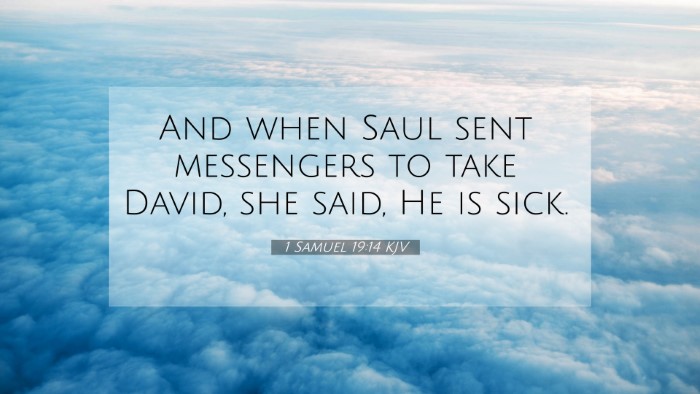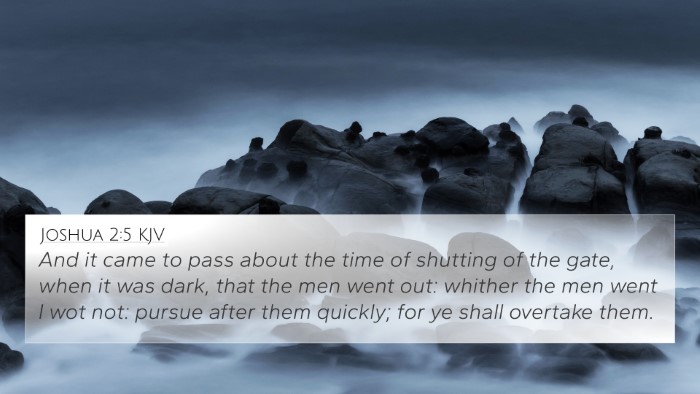Understanding 1 Samuel 19:14
Bible Verse: 1 Samuel 19:14 - "And when Saul sent messengers to take David, she said, He is sick."
Overview
This verse occurs in the narrative concerning King Saul's escalating hostility toward David. It captures the moment when Saul's messengers are dispatched to seize David, who is being protected by his wife, Michal. This act not only illustrates the depths of Saul's jealousy and paranoia but also highlights Michal's loyalty and cunning in safeguarding her husband.
Commentary Insights
Various public domain commentaries offer rich insights into the meanings and implications of this verse:
-
Matthew Henry's Commentary:
Henry underscores the malice of Saul’s actions, indicating that his desire to kill David stems from deep-seated jealousy and fear of losing his throne. The act of sending messengers reflects Saul's relentless pursuit of power, demonstrating how envy can cloud moral judgment. Michal's deception is celebrated as an act of courage, revealing her loyalty to David over her father.
-
Albert Barnes' Notes:
Barnes elaborates on the cultural context of Michal's lie. He presents her actions as not merely protective, but as strategic. By claiming David is sick, she buys time and protects herself from the wrath of her father while also shielding David from harm. Barnes also draws attention to the gravity of her decision to defy Saul, which reinforces the theme of loyalty over familial allegiance in several Biblical accounts.
-
Adam Clarke's Commentary:
Clarke provides a thorough examination of Michal’s cunning. He suggests that her lie was a necessary ruse to prevent bloodshed, illustrating a moral complexity where one must sometimes resort to deceit to preserve life. Clarke emphasizes this moment in the broader narrative of divine providence, showing how God works through human actions to fulfill His purposes.
Cross References
This verse is interconnected with several other scriptures, which reveal deeper themes of loyalty, deception, and the conflict between personal relationships and authority:
- 1 Samuel 18:17-30: Highlights Saul's jealousy towards David after David’s victories.
- 1 Samuel 19:1: Saul’s open intent to kill David is explicitly stated.
- 1 Samuel 20:32-33: Michal's loyalty to David is further illustrated when she assists him in escaping Saul's wrath.
- 2 Samuel 6:16: Depicts Michal's complicated relationship with David later in life.
- Proverbs 27:4: The Bible warns against the nature of jealousy, aligning with Saul's feelings toward David.
- Matthew 10:36: Jesus speaks of familial strife caused by loyalty to Him, echoing Michal's situation.
- 2 Corinthians 10:12: This contrasts envy and jealousy, drawing parallels to Saul’s attitude.
Thematic Connections
The themes of love, loyalty, and the human struggle with authority permeate this narrative. Michal’s actions, although deceitful, are portrayed in a favorable light due to their protective nature. This brings forth questions of moral dilemmas faced in human relationships where allegiance can conflict with familial duties or societal expectations.
Bible Verse Parallels
Understanding the relationship between this verse and other Biblical texts enhances comprehension:
- Esther 4:13-14: Similar themes of loyalty and protection manifest when Esther risks her life to save her people.
- John 14:15: The theme of love and loyalty towards God ultimately connects to the decisions characters make for their loved ones.
- Acts 5:29: The apostles, much like Michal, placed their loyalty to God above human authority.
Conclusion
1 Samuel 19:14 serves as a powerful reminder of the complexities of human relationships, loyalty, and ethical dilemmas. The insights drawn from various commentaries provide a richer understanding of Michal's intentions and the implications of her actions in the narrative of David’s rise and Saul's fall.





